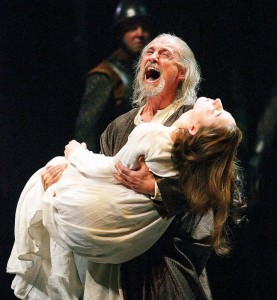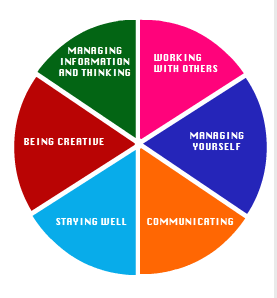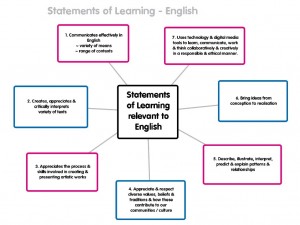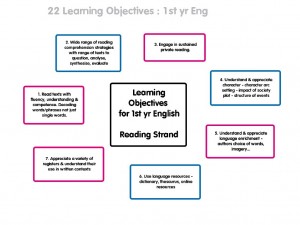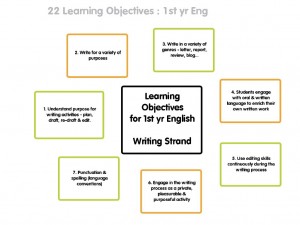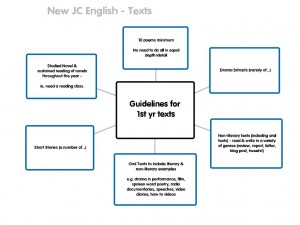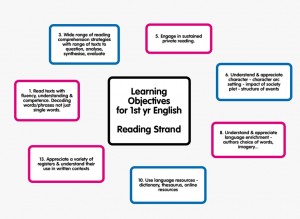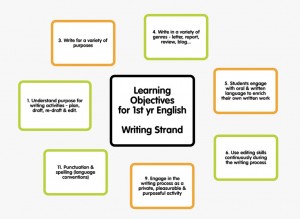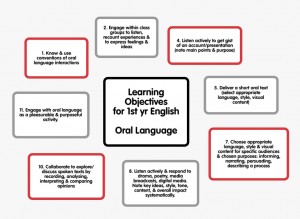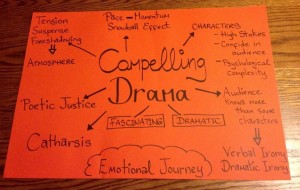Following a double class today, and in anticipation of a class tomorrow on Othello in which we’ll be examining what makes the play such “compelling drama”, it became clear to me that a more in depth analysis of what exactly my “10 features of compelling drama” mean might be helpful, before asking students to apply these concepts to a specific example.
So here goes:
1. Atmosphere – tension – suspense – foreshadowing
Definition = the atmosphere is the prevailing mood, the feelings which exist on the stage, between the characters. Any kind of conflict between them will create tension. Wondering what will happen next creates suspense. Dropping hints about what may lie in the future is foreshadowing – we can’t see it clearly, it is but a shadow, but we do have a feeling of foreboding, of dread.
Example = most horror movies begin with a tense, foreboding atmosphere, usually at nighttime, often aided by eerie silence, creaky sound effects or bad weather – rain, thunder, lightening – anything that makes it hard to see clearly which freaks most people out!
Effect = the mood on stage will have a strong impact on the audience. If it’s tense, we’ll feel tense. If it’s awkward, we’ll feel that awkwardness sitting in the audience. If something funny happens, we’ll join in with laughter.
2. Momentum. Sense of inevitability as the plot unfolds
Definition – momentum refers to the idea that the pace of events gathers speed as the plot unfolds, somewhat like a snowball getting bigger and moving faster as it rolls down a hill. It can start to feel like there is no going back, no way of slowing or stopping the chain of events which has been set in motion. When this happens, the audience get caught up in the action and can feel simultaneously frustrated and exhilarated by the seeming inevitability of the events. This is particularly true of tragedy where the downfall of the tragic hero appears almost impossible to avert.
Example: In Love/Hate, which opens with the murder of Darren’s brother, as each of his scumbag mates gets gunned down, it seems inevitable that he is heading inexorably towards his own annihilation and that this downfall is in many ways unavoidable.
Effect: A lively pace holds our attention, sweeps us up in the action and keeps the adrenaline pumping. It also provides a contrast for the quieter, more reflective moments, often reserved for the delivery of soliloquies.
3. High stakes – characters stand to win & lose a lot
Definition: If I stroll into the kitchen and feel torn between apple pie and crisps, this is not a high stakes choice. There will be no consequences so it doesn’t matter what I decide. But imagine if I was a super model (yup, the world’s shortest, stumpiest super model!) then this decision would suddenly be more significant, particularly if I had recently lost out on a job because I had gained a few pounds. Of course, there are some decisions that are inherently high stakes no matter who’s making them – the decision to lie is a high stakes decision, particularly if there’s a strong possibility that I’ll get caught. The bigger the lie, the higher the stakes. Ultimately there is no higher stakes decision than the decision to kill a person and the consequences are permanent. In almost all of Shakespeare’s great tragedies – Macbeth, Othello, Hamlet (but notKing Lear) the central character grapples with the decision of whether or not to kill another human being. High stakes choices indeed!
Example: Macbeth decides to kill the King and his crime (regicide) has horrific consequences for himself, his marriage, his country and his future. Hamlet hesitates whether or not to avenge his father’s murder and his procrastination leads to the unnecessary deaths of his true love, her father, Hamlet’s mother and a few more along the way! Othello, torn between his love for his wife and his faith in Iago’s loyalty, chooses wrongly and is led blindly down an evil path of revenge on those who have done no wrong. The consequences, as we shall see, are horrific.
Effect: In life, we all fear making the wrong choices, taking the wrong path and then suffering the consequences forever. We fear remorse, regret, despair, yet these is no guarantee in any decision we make that we are making the right one. Seeing the effect, for good or ill, of major life choices on the central characters of any drama, often reminds us that we are all flawed and human and that what they are going through we might one day end up going through ourselves.
4. Honestly from the central characters. Confiding darkest secrets in us
Definition: the absolute definition of honesty in a play are the moments when we get to see the inner workings of the central characters heart and mind. It’s not until we know what they’re thinking and how they’re feeling that we come to really know and understand them.
Example: In Shakespeare, soliloquies are used to give us this privileged insight into their innermost thoughts and emotions. In “Philadelphia, Here I Come”, the two sides of the one character, Public Gar and Private Gar are used to help us get closer to the inner workings of his psyche. In “Dancing At Lughnasa”, the narrator, Michael as an adult, provides a commentary on his childhood that offers an insight into his character whilst all the while reminding us that how he saw things was not necessarily how others experienced that summer.
Effect: Because we have a direct line to the central characters brain, we understand their motivations, we sympathise with them and feel a connection to them, often despite their bad behaviour. However, this connection can be problematic. Often we feel like shouting out panto-style at them to STOP! And we feel implicated in their bad behaviour, even though we have nothing to do with it, we’ve also done nothing to stop it (I know, I know, what are we going to do, stand up and start shouting at the actors on the stage? Lol!). The best way I can explain this is as follows: imagine a student of mine – let’s call her Jane – takes a dislike to me (I know! Inconceivable right?) and decides to slash the tires on my car. Her friend, Tarzan, quite likes me as a teacher and knows that I have an important hospital appointment after school, but is afraid to get Jane in trouble so says nothing. If Jane then goes ahead and slashes my tires, even though Tarzan didn’t plan this evil deed, or have anything to do with carrying it out, he will feel implicated in the crime because he knew about it and did nothing to stop it! Hopefully that makes sense!
5. Emotional & psychological conflict & complexity
Definition: The characters must seem like real people and real people are complex. We experience floods of conflicting emotions simultaneously and are often torn between two courses of action, which in turn causes conflict in our minds, in our psyche. If things get really bad, this mental and emotional conflict may drive us to madness or despair.
Example: as I eat chocolate cake, I feel satisfied, smug, content, greedy, guilty and gluttonous all at once – making me emotionally complex. There is a psychological conflict going on inside me as I indulge in my deep desire for chocolate but also feel shame and possibly frustration at my inability to control my impulses, particularly if it’s January and I’m trying to lose the weight I put on over Christmas. The ironic thing about this psychological conflict is that I may then go much further down this dodgy path, binging on the entire cake, instead of backing off for my own good. You see this in Shakespeare’s characters all the time, where they make one mistake and then they just keep making it again and again. That’s because human beings are complex (aka dopey!) and do not necessarily learn from their mistakes, or at least often by the time they do it’s too late!
Effect: We find complex characters believable and fascinating, which in turn helps us to buy into their story. You’ll often hear plays, films and novels criticised for having “one dimensional characters” which means they are flat and unrealistic and dull.
6. Battle between good & evil (internal as well as external)
Definition: Seeing a battle between good & evil unfold never goes out of fashion but audiences are weird. Sometimes we root for the villain (Walter White in Breaking Bad) because they are more interesting and compelling than the ‘good’ characters. This is why really good writers ensure that this battle often occurs within the central character, rather than between superheroes and ‘baddies’.
Example: Internally a character is often torn between doing what is right and doing what they want – think for a moment of those cartoons where a good angel perches on one shoulder offering advice, and an evil little devil sits on the other shoulder tempting the host to ignore his conscience and follow his desires. We find this endlessly fascinating because we too are often torn between doing what is right and what is enjoyable (often doing the wrong thing is fun and doing the right thing is dull dull dull!)
Effect: similar to one of the examples given above, a battle between good and evil often reminds us that we must decide whether we are a force for good or evil in the world. The internal battle reminds us that we are all flawed and human and that what they are going through we might one day end up going through ourselves. But it also reminds us that it’s ok to feel torn, that nobody’s perfect, which is nice to be reminded of every now and again!
7. Audience in privileged position – we know more than other characters
Definition: If I’m sitting in the audience, and I know something that one or more of the characters on stage doesn’t know, then I’m in a privileged position. If I could jump up on stage (but breaking the fourth wall – the illusion of this being ‘reality’ – is frowned upon so don’t so it!) I’d be able to tell them vital information which might completely change their behaviour and ultimately, their life!
Example: We know in Othello that Iago is a sick, twisted, sadistic little monkey who cannot be trusted but crucially no-one else in the play knows this!
Effect: We feel knowledgable and powerful. We understand what’s going on on a much deeper level than most of the characters and this makes us feel superior to them. However, we often nonetheless avoid judgement because we have seen the central character’s innermost thoughts and feelings to arrive at this position of superior knowledge, so we sympathise with them and recognise that the other characters couldn’t possibly have arrived at the same depth of knowledge without this opportunity to spy on the inner workings of the central characters’ brain.
8. Dramatic irony
Definition 1: Irony can be created when we, the audience, know something that the characters do not and they say something ‘ironic’ but only we can see the irony
Example: Characters in Othello keep commenting how honest and trustworthy Iago is.
Definition 2: Irony can be created when the opposite of what characters expect to happen, happens. This reversal of expectations is ironic because it’s so far from what they thought would be the case.
Example: Lady Macbeth at the start of the play believes that “a little water clears us of this deed” – that they can wash the blood off and that will be that. Ironically, later on, we see her obsessively washing her hands, saying “what will these hands n’er be clean”. It’s ironic that the physical blood is gone but her conscience is so fraught that she’s hallucinating blood stains that aren’t there. This situation is the exact opposite of what she predicted / expected.
Effect: we feel smart when we identify irony! We may also feel sympathy for the characters who are stuck in the ironic situation, but it depends whether or not we feel they caused it themselves (in which case they deserve their dose of situational or dramtic irony. If it’s not their fault though, we;ll probably feel sorry for them – and also perhaps frustrated that they can’t SEE the irony!
9. Poetic justice
Definition: Justice is where evil is punished. The punishment should fit the crime. Poetic justice is where the punishment is so fitting and so appropriate that we get an intense feeling of satisfaction out of the situation.
Example: If I steal your lunch and eat it, and then I get food poisoning from the very lunch I stole, that’s poetic justice. If I cheat on my husband and catch a sexually transmitted disease, that’s poetic justice.
Effect: The audience get a smug satisfaction out of seeing someone get what they deserve in a way which kind of makes it their own fault. It reassures us that the universe is on the side of good. In truth though, it’s called poetic justice, becuase you see it in stories far more often than you see it in real life! I hate to break it to you but in the real world the baddies often get away with their crime!
Catharsis:
Definition: Have you ever wondered why you like horror movies? Or violent video games (even though you’re not a violent person in real life)? Or Eastenders (it’s so bloody miserable and depressing all the time)? Or books that make you cry (I’m not a fan of “PS I Love You” but many of my – female – students love it)?
Some people suggest that we like all of these things because they’re not real. We can experience scary things in a fantasy way without putting our ‘real’ self in danger -the fear/rage/depression/sadness leave us as soon as we switch our brains off from the movie/video game/telly/book.
This process of temporarily experiencing negative emotions and then ‘cleansing’ them is known as catharsis.
Example: I was horrified watching the final scene of Breaking Bad but I was also relieved that evil had been defeated and I was glad I hadn’t ever had to make the terrible decisions Walter White did to protect his family.
Effect: We enjoy this process because it helps us to lose ourselves in someone else’s life for a while (if our own life sucks) or to appreciate how good we have it (if our own life is better than what we’ve just watched) when the movie/video game/telly/book ends.
[This list is not exhaustive. After I’d written it I began to think about other reasons we might find the play fascinating and dramatic. So my no.11 = relevance (e.g. Macbeth’s a tyrant. We’ve still got a few of them in the modern world; we’re still seeing innocents murdered in Syria & back in 2011 we witnessed the toppling of the Egyptian dictator Mubarak in the Arab Spring, thanks to a popular uprising – not unlike the events described in Macbeth, except Mubarak is still alive – not in prison but under house arrest. They didn’t chop his head off! So, watching a drama but connecting what’s happening on stage to what’s happening in the real world – or personally in your own life – is a really powerful reason a person might find a play compelling/fascinating & dramatic).
My no. 12 = emotional resonance (often with a character we connect to what they are going through. This resonance creates empathy – a much stronger emotion than sympathy – and we feel compelled to continue watching as events unfold because we are now invested in their emotional journey. I guess a weaker version of this explains why we often keep watching ‘the X-factor’, or ‘I’m a Celebrity’ long after it’s even remotely interesting, because we feel we’ve gotten to know the ‘characters’ on the show and want to see how it all works out for them). Anyway, my point is, my list of 10 features of Compelling Drama could easily be 12, and there are probably more I haven’t even thought of!]

